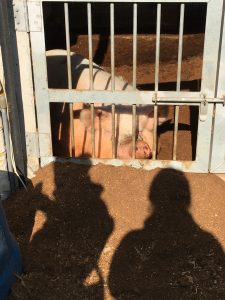
On my first and only day working with pigs during food life, I faced my first real inclinations towards vegetarianism. Although an organic farm, I was surprised to discover that ARI’s pigs are kept in small, darkly-lit pens with no space to roam freely outside. The reasoning behind the pens is understandable, as ARI was unable to maintain a grazing area for the pigs after the Fukushima disaster. (We can add this new information to the long list living things negatively impacted by Fukushima’s radiation fallout). Nevertheless, it was difficult for me to feel content with the pig’s living conditions as I scrambled to fill food buckets while I was bombarded with the pigs and their disturbingly human-like eyes as they screamed. I have always known pigs to be relatively intelligent animals, so seeing them kept in this condition was especially upsetting. Even more unsettling, as ARI participant Chigira explained to me in an interview afterwards, the way ARI treats its pigs is significantly better than most large-scale pig farms in Japan.
Chigira also helped me to realize the importance of direct interaction with livestock in understanding animal welfare. Her project on the justification of castration in male pigs in meat production required her to raise and eventually send to slaughter a pig named San-chan. As a vegetarian and a passionate advocate of animal rights, Chigira’s project was extremely difficult for her, and she explained to me that she still feels pain over San-chan’s slaughter. Nevertheless, she still firmly believes in her reasoning for the project: to better understand animal welfare. Like Chigira, I want to face difficult issues that I care about bravely and head-on, despite the emotional toll they may take on me. While seeing how the pigs at ARI are raised was stomach-churning and unpleasant, it helped to better understand where my meat comes from and what sort of treatment I am supporting when I consume it.
Although we have not focused specifically on animal welfare in this class, I see many parallels between the treatment of animals and environmental sustainability. Just as Avenell argues that it takes being in a particular place to understand larger ideas of environmental sustainability, so I think it takes first-hand and personal experiences with animals and meat production to understand larger ideas about animal welfare. While I firmly believe in the importance of treating animals with respect and consideration, working at ARI has also led me to see how environmental catastrophes like the Fukushima disaster complicate the decisions farms like ARI have to make about how they raise their animals. While I am still unsure about whether or not to go vegetarian, I hope to develop a stronger relationship with where my meat comes from and how it is treated going forward.
Recent Comments